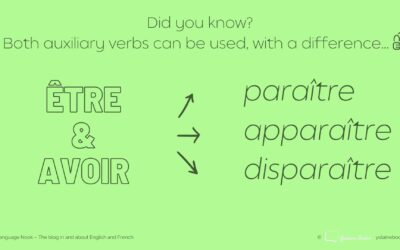You may be unsure as to what preposition –à, de or par– you should use after the French verbs commencer and continuer.
Well, rest assured you are not the only one for that is a question quite a number of students who attend my French classes ask. So, let’s see how you can choose between à, de and par after you use commencer and continuer in a sentence.
First of all, remember that both verbs commencer and continuer are not always followed by a preposition! Indeed, if the word you need after either commencer or continuer is NOT a verb, you do NOT need a preposition. Look at these examples:
- J’ai commencé ici. (I started here.)
- J’ai commencé ce matin. (I began this morning.)
- Il a commencé sa carrière à l’âge de 16 ans. (He started his career at 16.)
- J’ai continué comme ça. (I carried on like this.)
- Nous continuerons demain. (We’ll continue tomorrow.)
- Vous pouvez continuer votre navigation en toute sécurité. (You can safely keep browsing the Internet.)
However, if the word you need after the verb commencer or continuer is another verb, then you will need to choose a preposition. Remember that next verb will be in the infinitive form.
Here’s how you can choose between commencer à, commencer de, commencer par, continuer à, continuer de and continuer par.
Using the right preposition with commencer:
Commencer à and commencer de are not different in meaning and both are actually correct. As is often the case, the difference lies more in the usage.
Commencer à is much more frequent and tends to focus on the action described by the verb that follows:
- Elle a commencé à travailler à l’âge de 24 ans. (She started working when she was 24.)
- Ils commenceront à manger dès que le repas sera prêt. (They’ll start eating as soon as the meal is ready.)
- J’ai commencé à faire des balades sur la plage chaque week-end. (I started going for walks on the beach every weekend.)
Commencer de is not so common; you will see it more in literature because it is regarded as more polished. Commencer de tends to focus less on the action expressed in the following verb and more on beginning itself. Note that commencer de seems to be hardly ever used, if at all, in the present tense:
- Il avait commencé de pleuvoir. (It had started raining)
- Vous avez commencé d’enseigner. (You started teaching.)
- Nous commencerons de nous instruire. (We’ll begin to learn.)
With commencer, it is clear you can choose commencer à most of the time. Just remember commencer de means the same when you happen to see it in a text.
Careful! Débuter can be a synonym of commencer, but it is used differently. You can learn the difference between commencer and débuter in this previous Language Nook’s post.
Using the correct preposition with continuer:
Again, continuer à and continuer de are not very different and often interchangeable, yet, as with commencer, the preposition à is more frequent, especially when speaking.
However, there is an interesting nuance between continuer à and continuer de.
Continuer à means to keep on doing something, to continue the action described in the following verb:
- Ils ont continué à discuter toute la nuit. (They kept on talking all night)
- Continuez à lire cet article, ne vous arrêtez pas ici ! (Keep reading this post, don’t stop here!)
Continuer de also means to keep on doing something, but more when we are talking about a habit.
Compare:
- Je lui ai demandé d’éteindre sa cigarette, mais il a continué à la fumer tranquillement. → Here continué à means he didn’t stop smoking his cigarette despite my asking him to put it out.
- Il voulait arrêter, mais il a continué de fumer pendant des années. → Here continué de means he kept smoking as a habit, as he was used to.
- Elle est partie à pied de bonne heure et a continué à marcher longtemps. (She left early and kept on walking for a long time.) → Here we talk about a walk she started early and that lasted for a long time.
- Tu continues de marcher sur la plage le week-end ? (Do you still go for walks on the beach at weekends?) → Here we understand that walking on the beach at weekends is a habit.
Useful tip! Remember we say in French avoir l’habitude de. So continuer de is to keep doing something out of habit. In both cases, keep the use of de.
You will have understood by now that the preposition à is more common after both verbs commencer and continuer. It’s the preposition to choose whenever you are not sure about using de. Yet, if you can use de correctly, you will show that the French language has no secret for you! 😉
Note! If the verb you need after commencer or continuer begins with the letter a, you can choose de instead of à so as to avoid the hiatus à – a, as in:
- Tu as commencé à apprendre ta leçon de français ? → Tu as commencé d’apprendre ta leçon de français ? (This way, you avoid the repetition of the double sound à – a)
Now, let’s see when we should use the preposition par
Par can be followed by a verb (infinitive), an adverb, a pronoun ou a noun. Use par after commencer and continuer when listing at least 2 actions or two items:
- On va commencer par éplucher les pommes. → Here peeling the apples is a first action (commencer par), it is understood that at least another action will follow.
- On continuera par les couper. → Here, cutting the apples is an action that follows another (continuer par).
- Commencez par lire cet article. (Start with reading this post.)
- Continuez par écrire un commentaire. (Next, write a comment!) 😉
There you are! You can now use commencer and continuer à, de or par with more confidence. Well done! 🙂





Bonjour Yolaine
Post très intéressant, comme d’habitude, mais très difficile.
Merci
Very interesting post, as usual, but very difficult.Thank you
Thank you for your comment Maria. Yes, I know it’s not always easy to choose between à and de after commencer and continuer, that’s why I advise sticking to “à” which is much more common anyway unless you’re sure about being right in choosing “de”. I think the use of “par” is much easier to understand, isn’t it?
I just found this severely underrated blog. Genuinely, thank you so much for this post.
Hi there! Just wanted to say that this blog is amazing, it’s totally unusual!
I hope you keep on helping us like that because I have been learning so much. Thanks for all! 😃👍
Thank you ever so much Melquizede, I am really happy to hear my blog can help! Of course, I will post more articles in the future. 🙂
Thank you. This is a really clear and concise explanation which has helped me greatly 😊 Merci infiniment
Thank you Zahra, this is just the kind of comment that is a great reward for the time spent on my blog articles! I am sincerely glad you found my explanations to be very helpful 🙂
Thank you. This is the clearest and most concise explanation I have seen.
Thank you Marie, I’m glad I could help! 🙂